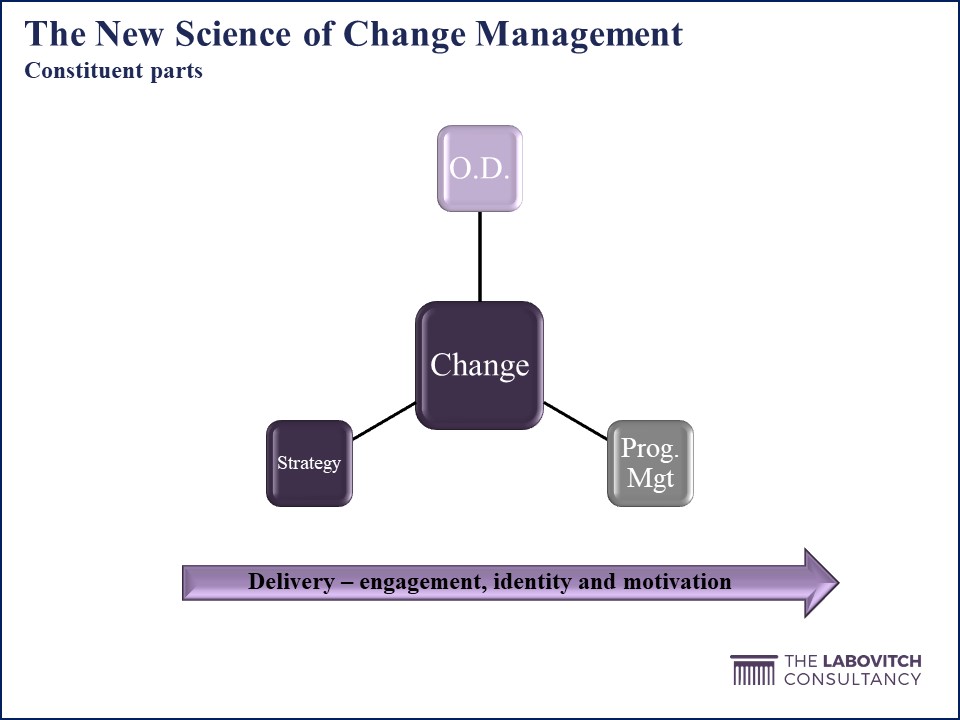

Mid Nineties, Change Management “Does not Exist”.
“Is it change management or the management of change?” argued the partners of my Big Four consultancy employer in 1995. “Our conclusion - neither exist as management disciplines.”
Such summary justice was meted out in London’s Square Mile in the mid-nineties as I sat bewildered, knowing that although it was a common view at the time, somehow, they must be wrong.
From that time onward, I was committed to work on change projects and develop the knowledge and practice of this emerging and fascinating discipline.
Not just Programme and Project Management.
It’s interesting that management consultancy had originally developed from the Chicago accounting firm McKinsey, in order ‘to apply accounting principles to management’. In UK our large audit practices similarly adopted management consulting as a branch of their work and portfolio.
It’s not surprising therefore that these cultures were strongly analytical and weren’t able to recognise the cross-discipline complexities of what is now known as change management. The key practices of programme and project management were being developed and became paramount in assignments of the day – mainly IT focused ‘systems integration’. Very linear, very analytical, very driven by the lines on a plan.
Step in Behavioural Science
Alongside the rational approach emerged a new and exciting study known as behavioural science. It placed emphasis on ‘human factors’ and the realisation that work and therefore change couldn’t happen without people, and that people are complex and actually quite fascinating. The science of psychology and works of Jung and others gave us new models of how people might behave and relate.
Behavioural science as it related to the world of work became known as ‘organisation development’ or building organisations based on business needs and human capabilities.
Change management is born
Thus far we have programme management and organisation development (O.D.).
The third element in the mix is ‘strategy’. At one time the domain of the strategy consultants alone, strategic thinking and relating business need into practice is an essential part of the change armoury.
So a change model emerged shown in the following diagram, of the three components - programme management, organisation development and strategy.

Implementation is realised through delivery, which is the practical ability to plan, organise and ‘make things happen’.
Also, rational thinking alone is not enough. You must think creatively and in pictures to form visual identity for the new organisation and also engage the workforce in new ways of working.
Engagement, importantly, is based on emotional buy in, and we are engaged when we do things differently.
The pace of change
The Change Management Institute ( www.change-management-institute.com) promotes best practice CM worldwide and does splendid work in defining competencies, training change managers and hosting events.
Change management is now firmly come of age, and many organisations are creating Enterprise CM to embed change management across the business.
Much is talked about a 4th Industrial revolution driven by data and connectivity, where organisations need to be ahead of the pace of development and continually manage change.
Nothing lasts for long in this new world. Compare the renaissance and the discovery of art and science leading to the first industrial revolution.

It’s ironic that works from this time of our great artists - Leonardo, Michelangelo and composers - Bach, Mozart and Beethoven and the works of Shakespeare are timeless.
Change in ‘the 4th Age’ is fleeting, but nevertheless exciting and challenging.
Welcome home
Another irony is that my former Big Four consultancy employer is now a bastion of CM and recently hosted the Change Management Institute in a gala event with keynote speakers and urgent discussion on pressing change issues.
Welcome home Leon.
How things change!
Leon Labovitch is CEO of The Labovitch Consultancy www.labovitch.co.uk and presenter of The Eight Pillars of Change.
The Labovitch Consultancy
Strength for Change, Success for Transformation.
At The Labovitch Consultancy we are pleased to discuss any potential project with you even at the earliest stage. We will do so freely without cost or obligation but of course in the strictest confidence. Please Contact Us for more information.